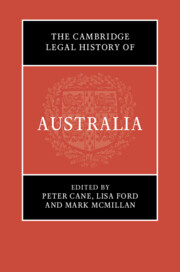Book contents
- The Cambridge Legal History of Australia
- The Cambridge Legal History of Australia
- Copyright page
- Contents
- Figures
- Maps
- Contributors
- Maps
- 1 Editors’ Introduction
- I Cultures of Law
- 2 Plural Legal Orders: Concept and Practice
- 3 English Legal Culture in the Late Eighteenth Century: Institutions and Values
- 4 Challenging Settler State Legal Fantasies: Basic Precepts of First Law
- II Public Authority
- III Public Authorities in Encounter
- IV Land and Environment
- V Social Organisation
- VI Social Ordering
- VII Reckonings
- Index
4 - Challenging Settler State Legal Fantasies: Basic Precepts of First Law
from I - Cultures of Law
Published online by Cambridge University Press: 04 August 2022
- The Cambridge Legal History of Australia
- The Cambridge Legal History of Australia
- Copyright page
- Contents
- Figures
- Maps
- Contributors
- Maps
- 1 Editors’ Introduction
- I Cultures of Law
- 2 Plural Legal Orders: Concept and Practice
- 3 English Legal Culture in the Late Eighteenth Century: Institutions and Values
- 4 Challenging Settler State Legal Fantasies: Basic Precepts of First Law
- II Public Authority
- III Public Authorities in Encounter
- IV Land and Environment
- V Social Organisation
- VI Social Ordering
- VII Reckonings
- Index
Summary
Mary Spiers Williams offers the reader a provocative invitation to reflect on the centring of State law and to critically engage with its impact on First Peoples and more broadly its facilitation of dispossession and its structural bias against First Peoples in Australia. She asks readers to reconsider the nature and authority of law and legal systems transplanted to effect colonisation. Focussing on Australian criminal law, she challenges assumptions about its lawfulness and just–ness, and insists that the reader see its inherent violence against Indigenous people, ways of being and law. This provocative and uncomfortable essay endeavours to create the possibility that readers will gain some insight into Aboriginal Peoples’ perspectives. It does so first by sharing stories of First Peoples experience of state law and their practice of their own law. It also does so by offering another way of understanding what is lawful. Williams asks readers to consider what it might mean to shift their perspectives: what might happen if we assumed that all law derives from Country, not from courts or legislators? and that lawful behaviour, at minimum, requires us to recognise that everyone and everything is interrelated? At base it would require the state to stop claiming the primacy of its law, and to recognise instead, that, in Australia, two laws (First and State) exist under, and are subject to, one law (derived from Country).
Keywords
- Type
- Chapter
- Information
- The Cambridge Legal History of Australia , pp. 61 - 84Publisher: Cambridge University PressPrint publication year: 2022
- 1
- Cited by



